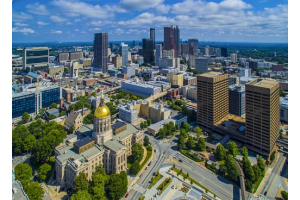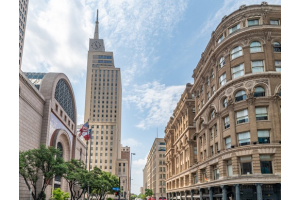‘Remotely from Georgia’ Lures Digital Nomads to Eurasia

The Republic of Georgia has opened its doors to digital nomads and entrepreneurs through its “Remotely from Georgia” program.
The Eurasian country is one of several nations that introduced “digital nomad” programs in mid-2020 to boost tourist industries devastated by the COVID-19 pandemic. “Remotely from Georgia” allows freelancers, full-time employees, and business owners from 95 countries (including the United States) to temporarily relocate to Georgia. They can stay for 180 to 360 days without a visa while continuing to work for overseas employers or for themselves. According to an MBO survey cited recently by The Wall Street Journal, there are more than 10 million U.S. citizens who combine travel with remote work.
Located in the Caucasus region at the crossroads of Eastern Europe and Western Asia, Georgia borders the Black Sea, Russia, Turkey, Armenia, and Azerbaijan. Since the country gained independence from the Soviet Union in 1991, Georgia has built a stable democracy with modern infrastructure that supports efforts to create a global tourism destination. Tourism to Georgia has expanded rapidly since the start of the century, growing from fewer than 100,000 visitors to 6.5 million in 2019. Georgia ranks as one of the safest countries in the world. It is also one of the few nations to limit growth of the COVID-19 virus, with only 1,000 infections reported among its 3.7 million residents at the end of 2020.
The “Remotely from Georgia” program allows you to stay and work in Georgia for up to 12 months. The program had already drawn 2,700 participants during the last five months of 2020. Participants include entrepreneurs, previous visitors, and digital nomads who were already self-employed and/or worked from different countries around the world. Permit holders live in Georgia while continuing to earn money from employers in North America or Europe, and pay minimal taxes on their earnings. The program is also attractive for people who need to get away for a long-term creative project, such as writing a book. Those who are interested in pursuing the digital nomad lifestyle but do not currently have a remote employment situation can find remote jobs on the Internet at sites such as https://www.dynamitejobs.com.
Natural Wonders, Historic Culture Lure Visitors
Tbilisi, the capital of Georgia since 1122 and its largest city, provides a traditional yet contemporary European-flavored destination. This historic city was once a stop on the ancient Silk Road trading route. Tbilisi blends ancient castles, historic churches and monasteries, corner cafes, and cobblestone streets with world-class restaurants, modern architecture, and vibrant nightclubs. Georgia considers itself the birthplace of wine, and Tbilisi offers a wide selection of natural wine bars. Tourists enjoy taking a cable car to Narikala Fortress for panoramic views of the city.
Backpackers provided the first wave of tourists to Georgia, lured by low-cost hostels plus trails winding through national parks, deep caves, and the lower Caucasus Mountains. After the government began actively expanding tourism infrastructure in 2008, new travelers discovered churches, cultural sites, sandy subtropical beaches, alpine skiing venues, wine tours, and both budget and high-end accommodations.
The city of Mtskheta, the religious and spiritual heart of Georgia, boasts three of Georgia’s most important churches and monasteries. Batumi, the second largest city in the country, is a modern tourism and casino center on the Black Sea. Other popular destinations include the Vardzia cave monastery in southern Georgia; the abandoned “Lord’s Fortress” cave city of Uplistsikhe to the east; Chiatura, the “cable car” city; the Caucasian fortress village of Shatili Khevsureti; the alpine resort of Bakhmaro; and hiking to Gergeti Glacier.
Low Cost of Living
Another strong draw for tourists and remote workers alike is the low cost of living in the Republic of Georgia, particularly for housing costs. Tbilisi ranks among the Top Five cities in many global surveys for cost of living, and among the least expensive 10 percent in other studies. For example, rent for a good apartment in the center of Tbilisi runs as low as $300 per month. Airbnb also has inexpensive short-term options for lodging while longer-term housing. Numbeo (https://www.numbeo.com/cost-of-living/in/Tbilisi) reported that the monthly cost of living for a family of four (excluding rent) was $1,410 in February 2021. Numbeo also stated the cost of living in Tbilisi was 71% lower than that of New York City, and rent averaged 88% less than the Big Apple.
The city also offers high-speed Internet connections; healthy, inexpensive food; and supermarkets and other retail stores with plenty of Western products. While several co-working spaces have emerged, there are also plenty of coffee shops where Wi-Fi connections are available.
Applying for the Digital Nomad Program
Residents of the United States or other approved countries must first submit a preliminary application form (https://registration.gov.ge/pub/form/20/ydrv71) for the special digital nomad permit. The one-page form includes such basic information as nationality, passport details, planned dates of visit, type of work you will do, and contact data. Processing typically takes 10 business days.
After obtaining initial approval from the Georgia government, applicants will also have to submit other required information, such as:
- Valid U.S. passport.
- Financial information. You must prove you earn at least $2,000 monthly (or in some cases, that you have at least $24,000 in savings), which demonstrates your ability to pay local taxes.
- Proof of travel medical insurance.
Foreign air service resumed on February 1, 2021, but flights are limited and government regulations continue to change. When you arrive in Georgia, you may need to quarantine at your own expense for at least eight days. After quarantine, applicants must undergo PCR testing at their own expense. If no signs of coronavirus are detected, they can remain in Georgia.
However, in early 2021, the government revised its policies concerning quarantines and vaccinations on the application website. “All foreign visitors to Georgia can freely enter the territory of the country if they provide COVID-19 vaccine certificates saying that they have received two full doses of vaccines,” the government stated.
Non-vaccinated visitors who are nationals or residents of the United States, the European Union, and several other countries will not need to self-isolate, the site continued. “Upon entry to Georgia, including through transit, they will have to provide a negative PCR test taken within 72 hours (96 hours for visitors traveling from the U.S.) before their arrival and undergo a second PCR test at their own expense on the third day of arrival in Georgia. Non-vaccinated visitors who have traveled to the United Kingdom of Great Britain and Northern Ireland within the last 14 days are subject to a 12-day quarantine.
From more information about the “Remotely from Georgia” program or digital nomad programs in other countries, you can call Visa Supply at 404-682-5445 or email us at admin@visasupply.com.





